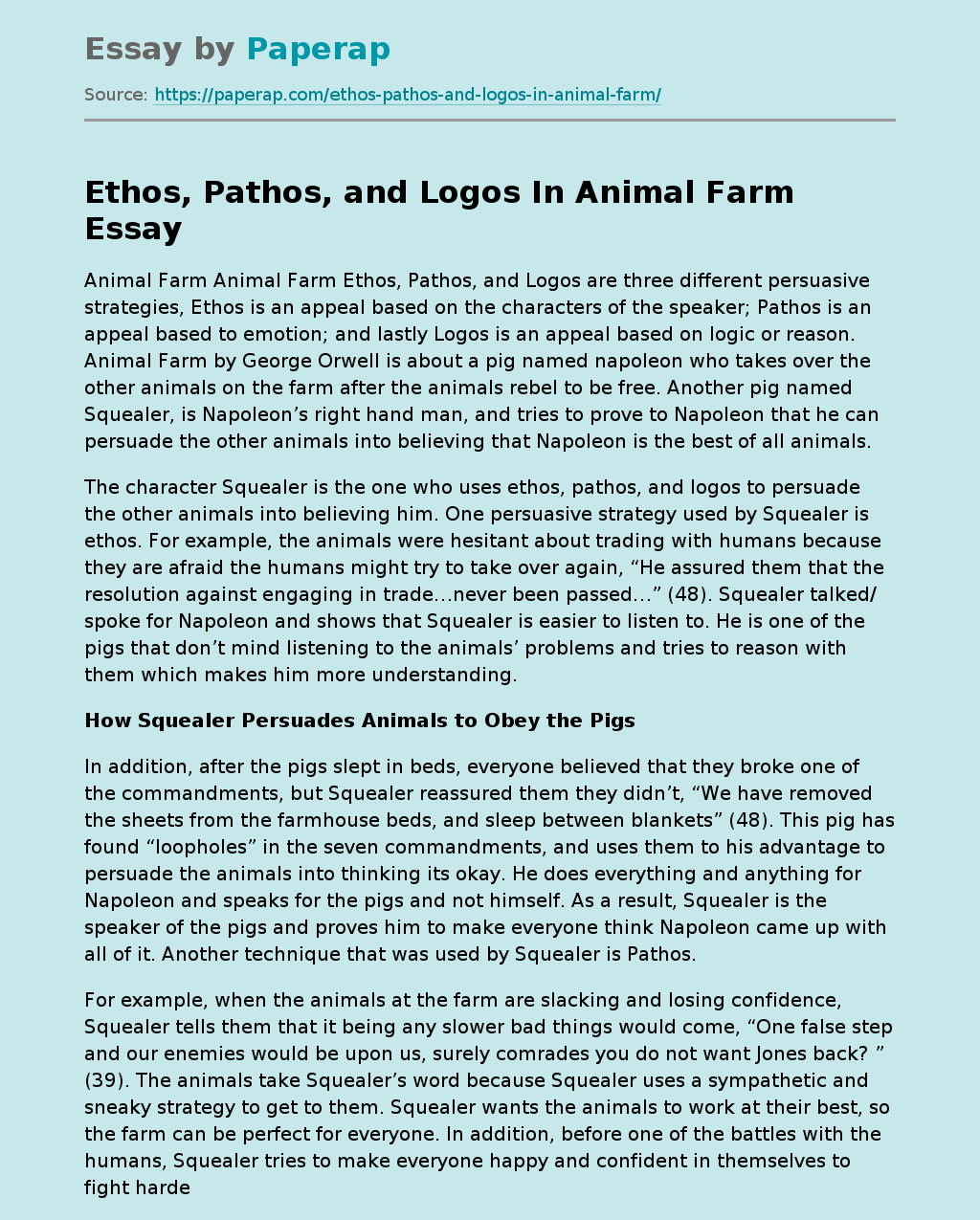Ethos, Pathos, and Logos In Animal Farm
Animal Farm Animal Farm Ethos, Pathos, and Logos are three different persuasive strategies, Ethos is an appeal based on the characters of the speaker; Pathos is an appeal based to emotion; and lastly Logos is an appeal based on logic or reason. Animal Farm by George Orwell is about a pig named napoleon who takes over the other animals on the farm after the animals rebel to be free. Another pig named Squealer, is Napoleon’s right hand man, and tries to prove to Napoleon that he can persuade the other animals into believing that Napoleon is the best of all animals.
The character Squealer is the one who uses ethos, pathos, and logos to persuade the other animals into believing him. One persuasive strategy used by Squealer is ethos. For example, the animals were hesitant about trading with humans because they are afraid the humans might try to take over again, “He assured them that the resolution against engaging in trade…never been passed…” (48).
Squealer talked/ spoke for Napoleon and shows that Squealer is easier to listen to. He is one of the pigs that don’t mind listening to the animals’ problems and tries to reason with them which makes him more understanding.
How Squealer Persuades Animals to Obey the Pigs
In addition, after the pigs slept in beds, everyone believed that they broke one of the commandments, but Squealer reassured them they didn’t, “We have removed the sheets from the farmhouse beds, and sleep between blankets” (48). This pig has found “loopholes” in the seven commandments, and uses them to his advantage to persuade the animals into thinking its okay.
He does everything and anything for Napoleon and speaks for the pigs and not himself. As a result, Squealer is the speaker of the pigs and proves him to make everyone think Napoleon came up with all of it. Another technique that was used by Squealer is Pathos.
For example, when the animals at the farm are slacking and losing confidence, Squealer tells them that it being any slower bad things would come, “One false step and our enemies would be upon us, surely comrades you do not want Jones back? ” (39). The animals take Squealer’s word because Squealer uses a sympathetic and sneaky strategy to get to them. Squealer wants the animals to work at their best, so the farm can be perfect for everyone. In addition, before one of the battles with the humans, Squealer tries to make everyone happy and confident in themselves to fight harder, “Surely none of you wishes to see Jones back? (48). The pigs think, especially Squealer, that the other animals show weakness in points of where Jones is concerned. Squealer makes the animals believe life before Napoleon was worse, which it wasn’t. As a result, Squealer plays with all the animals’ emotions to get what he wants as a pig. Lastly, logos is the last persuasive technique used by Squealer. For example, when Squealer tells the animals how good everything is going, he is just making up statistics to make the animals happy, “lists of figures proving the production of every class of food staff had increased by two hundred percent” (63).
Squealer has to lie about the percentages of food productions because they are worse than before, when Jones was there. Napoleon and Squealer were too busy working and taking the food for themselves to care about the others, and they believe the animals are stupid enough to believe the statistics. In addition, when Squealer tells the other animals they as in the pigs are more important they say that because they want more food than the others, “We pigs are brainworkers” (25). The reason the pigs use for more food is persuading the animals into thinking the request was reasonable.
The pigs, (Squealer) make up reasons that do not make any sense, just to get what they want. As a result, Squealer’s made up; unreasonable excuses fool the animals so the pigs can have/do anything they want. Animal Farm, by George Orwell, is using three persuasive techniques used by Squealer, one of the characters in the book, and those techniques are ethos, pathos, and logos. First thing is when Squealer uses loopholes in the seven commandments and tells the animals it’s okay.
Especially when Squealer tells all the animals that the pigs can sleep in beds without sheets, or when the pigs can trade with the humans. Then, Squealer plays with the animals’ emotions and threatens them by saying Jones will come back. Lastly, Squealer tries to tell the animals that they are doing so much better with food production when they weren’t. All of these techniques prove Squealer being persuasive through emotions, to statistics, to other characters, this is because Squealer shows all the characteristics of someone who can be easily listened to.
Ethos, Pathos, and Logos In Animal Farm. (2019, Dec 05). Retrieved from https://paperap.com/ethos-pathos-and-logos-in-animal-farm/

